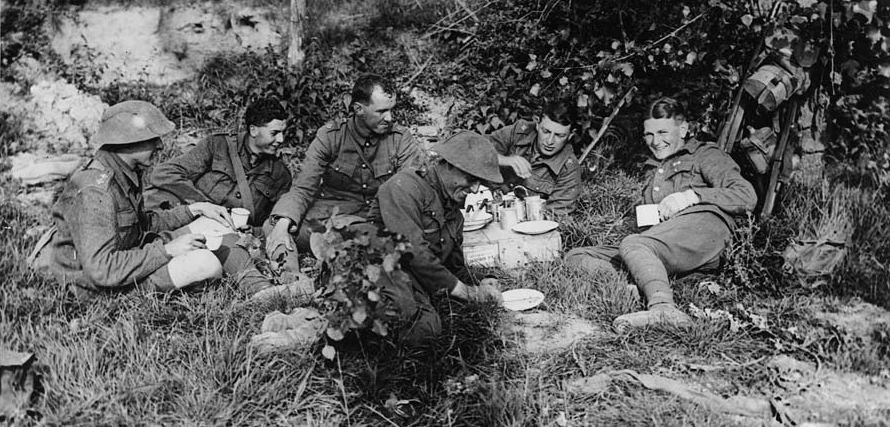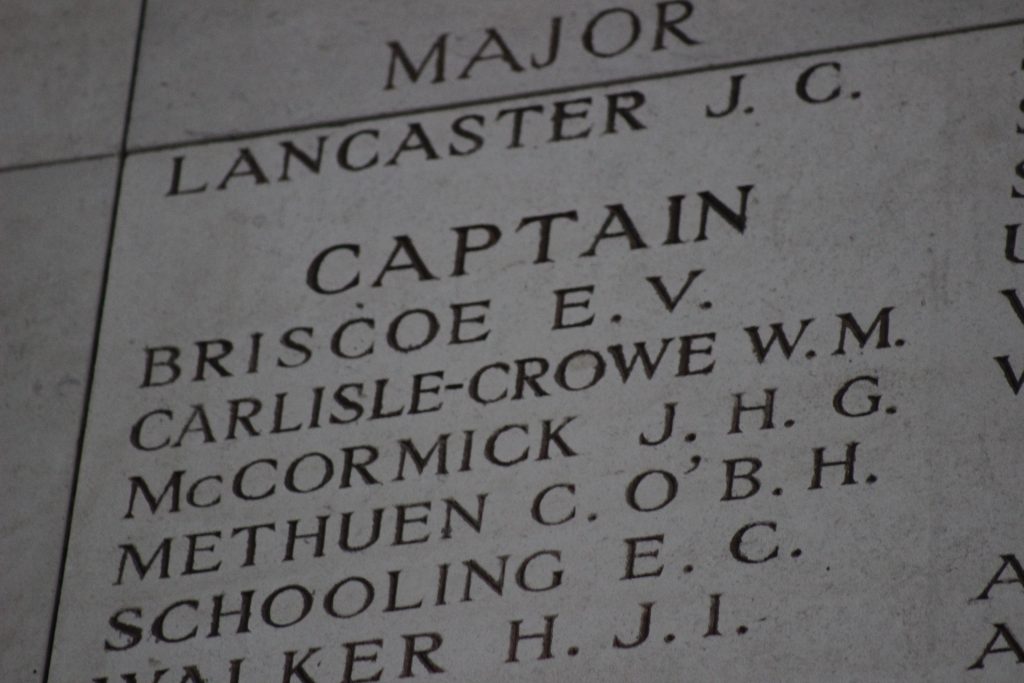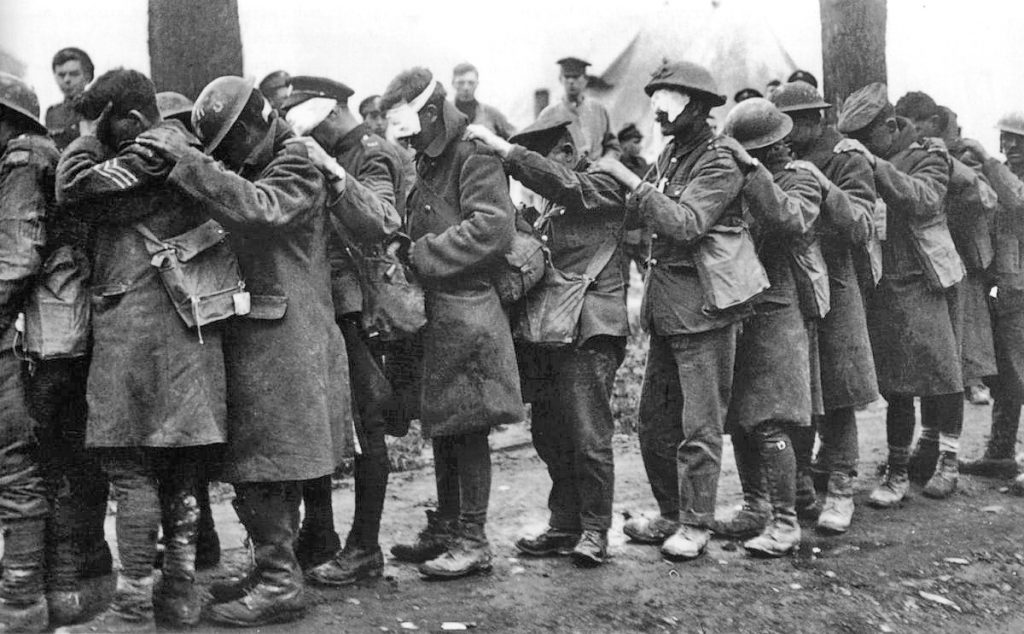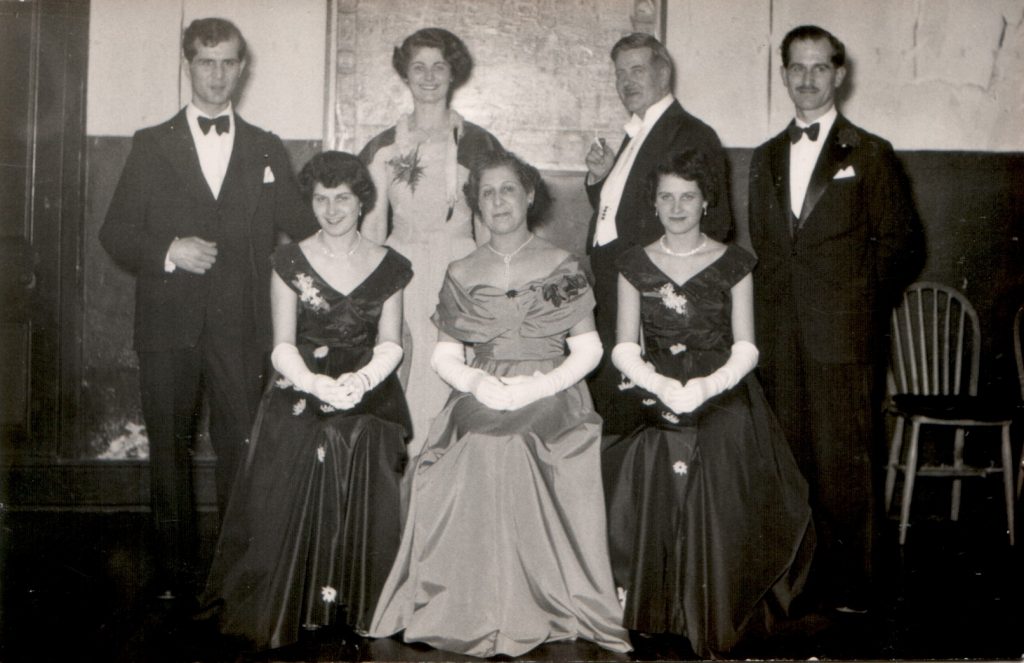
What was is like to fight in the First World War? It is a question no living person can answer, but we have inherited many stories from the dead.
My Great Grandfather, Charles Lander, kept a diary of his active service. It is a glimpse of the life of a fairly junior officer in a most extraordinary war. There are heroics and horrors – but he also chose to record some of the boredom, the bungles, the friends he made and lost, and perhaps most strikingly, vivid personal reflections on his own mistakes.
Initially rejected from the army because he was too skinny, Charles, a member of the Officers Training Corps at university, left Birmingham for the Army in 1914. He received a year of training before leaving for France in April 1916 where he was to fight in ‘Kitchener’s Army’, the masses of young men of largely ordinary professions who ‘answered the call’. He was proud, yes. But also nervous.
He is courting his fiancee Doris when he is given his orders. At home one weekend on leave he recalls feeling “very peaceful and very much in love” when “a telegram arrived giving us orders to proceed overseas. I must confess that rather a lump developed in my throat and all sorts of fears ran through my mind of what the future had in store for me; whether this was to be my last afternoon in the old house. Fortunately H. Allenby dropped in for tea and sentimentalities were forgotten. The morning came and I said goodbye.”
At 2pm on 20th April 1916 he arrives at Boulogne: “as I stepped on the quay realised that this was the beginning of a new life; full of thrills and new interest. There were thousands of khaki-clad soldiers about of all units; new drafts, officers and men returning from leave; red tabs and blue tabs; and brass hats by the score.” His division is set for the Battle of the Somme, where they would be a ‘flying column’, advancing 10km a day after the line was broken (this is not how it turned out of course, as you can read in my abridgement of his diaries of that battle).
Fortune and failure
His diary from start to end recalls tales of unfortunate errors and good fortune both.
For starters, he gets told-off a lot. On his first day in Company HQ he is shouted at by the Officer Commanding for meddling with a trench map: “I apologised and shrivelled up somewhat… I was scared of him for days afterwards”. He variously leads supply groups on “short-cuts” which turn out to take much longer, loses his way in the dark, and is severely reprimanded for giving up on laying a telephone cable half way through the job.
On training he tries horse riding. On first attempt the horse bolts: “I would have split my head on the stable door but for the fact that by this time I was hanging under the animal’s neck; and all this in view of stable men and crowds of infantry splitting with laughter.”

Behind the line one evening he and another officer go for a stroll only to be “literally chased by a Boche plane dropping bombs.” Instead of dropping into a ditch, they run into a barn, attracting fire into the farm and “thereby increasing the target”, he scolds himself.
In the Somme he is approached by a gunner on horseback “a sorry mess, covered with blood from head to foot… the poor thing had stopped one in the neck and every time it took a step and moved its head the blood gushed out and smothered itself and its rider.” Charles is obviously shaken. The gunner pleads with Charles to put the horse out of its misery but he is worried about getting in trouble for killing a (valuable) horse and equally worried that he would mess up the job: “I was not very handy with a revolver and thought if I shot the poor beast it might take half a dozen shots as I didn’t want to get too near and get all bloody myself.” The poor gunner trudges on.
Despite his inadequacies and foibles, Charles pushes through every test. Some of his good fortune is almost monumental. In 1916 he misses the first day of the Battle of the Somme – the deadliest day of fighting in the history of the British Army – simply because he is in the 50% of officers kept back for the second day of fighting. In 1917 he is ordered to leave the front for a training course on the eve of the Battle of Passchendaele – he would later join the battle at the start of its third month.
Life away from the front
Time off was precious, and received gratefully. Leaving the front after the end of Passchendaele he is treated to “a good honest steak and chips with beer… What a meal… I never before appreciated a meal, or life, so much as I did that afternoon.”
Contrasts between life on the front and behind it, perhaps even just a few miles away, are poignant. On training in the Somme region he writes “…the only trees in the district seemed all gathered together in woods which stood out as landmarks. The few farms in the district were far between and the peasants houses usually clustered together as small villages, only made of beams with plaster or mud between, with floors of beaten earth.
“We had occasional bathing parades in the River Somme. The river district was very beautiful, the river here consisting of a number of deep and dark pools of icy cold water, with marshy ground covered with rushes and iris between; the river proper wending between with an almost imperceptible flow. There were at this time of the year myriad of highly coloured butterflies and dragonflies about.”
After the Somme he is stationed on the Messines Ridge during a quiet spell. He takes care to describe “…the most perfect communication trench, 6 to 19 ft deep, with duck boards in A-1 condition, sides revetted, sometimes with wire and sometimes with brushwood. Above us and overhanging the trench in places the vegetation was growing thick, and coloured with heaps of poppies and cornflowers. The trees were untouched by shell fire and the hedges grew thick.”

He makes good friends in his battalion and his notes dip into and out of fun and adventure.
At one training he even has the opportunity to fly in a reconnaissance aeroplane. “It was thought necessary that signal officers should view the methods from the airman’s point of view. A splendid idea of course.” At the Somme his Division is visited by the King Albert of Belgium who “presented every man with a packet of cigarettes.” And he recalls with glee how his comrades managed to hide a gramophone from a senior officer despite his order that “all surplus kit and musical instruments were to be dumped… He had the officers kit weighed and inspected – but the gramophone still survived.”
Although frustrated at the enemy, he is frequently in awe of their efforts. He records how German prisoners of war did “good work” bearing stretchers from the battlefield “cheerfully giving a hand and chatting and smoking with our fellows as though they had always been the best of pals.” A friend is captured, but reveals after the war the good treatment he received. His most common remark about prisoners of war, noted time and time again, is the smirking faces of prisoners being led away from the front towards him and his fellow soldiers being sent into battle.
He seems intrigued by the French. They “make war look picturesque and almost romantic. When a shell bursts among them you hear a lot of jabber and shouts of ‘Vive la France’ as they poop off with renewed energy – so unlike our chaps who just curse and blast.” Near Ypres an older peasant woman comes to a farmhouse they are staying in asking if they had found her missing 200 Francs. When they were returned “the Madame in her joy kissed the Captain (or tried to) and was loud in her praises of ‘Les Soldets Anglaise’.” Even away from the fighting poverty is rife, and he notes with sadness how little he can do for struggling locals and the many moving refugees.
Making a fight of it
Back on the front, the story is well trodden.
Winter on the Western Front brings few battles: they must simply be endured. He spends many months of the winters of 1916 and 1917 in the trenches, variously cold and wet, or cold and frozen; so cold it is “impossible to sleep”, he notes around Christmas 1917.
When the snow melted things were worse. The Somme battlefield was “a vast sea of mud and slime, not a tree or a building of any form in sight, not a tree stump even a foot high, not a blade of grass.” Resting soldiers made the best of it, some even sleeping in a pig-sty: “it was dry, if not clean, and offered protection against bombs.” In late 2017 he is stationed in tunnels under the infamous Hill 60, Ypres, “the bowels of the earth”. Conditions are grim.
By early 1918 he reports that one third of his battalion has trench foot. “Everyone was lousy and spent most of their spare time scraping the fat louses from the backs of their shirts and from the seams of their uniform; some cracked the blighters between their thumbnails, others burnt them over a candle flame. The huts were very filthy and overcrowded, and the stink from the unwashed; the wet and steaming uniforms mingled with foul tobacco smoke will never be forgotten.”
Death is everywhere. The company has nine officers when he joins is in 1916, that year four are killed and three are injured. His best friend in the army, F. P. Smith, is badly injured by a gas attack in 1917, and he receives a number of minor wounds himself.
He sees hundred and hundreds of dead men, sometimes roughly buried, more often simply strewn about. In the Somme he tells of trenches “chock full of German and British dead”; at Ypres sump holes “infested with rats as big as rabbits waiting to devour the dead… or even the dying.”
Charles is not desensitised to these horrors. He records them with care, noting the names of fallen comrades and the scene before his eyes. In one incident he writes that Edward Briscoe, a 22 year-old Lieutenant from Canterbury, is shot dead after getting lost in no-man’s land at night. His body falls into a German trench and is never found.

Unsurprisingly Charles is haunted by these experiences. In a break from fighting on the Somme he recalls dreaming he was in a dug-out, waking “in a sweat” and running to the window being convinced that they were “coming down the steps to take us.” When he tells the story at breakfast he is laughed at.
Charles doesn’t attempt to weight the value of this suffering. Nor is it overwhelming; he takes his share of personal and military success.
At the Battle of Messines, the British detonate 19 mines under the German front (said to be some of the biggest man-made explosions before the atomic bomb) enabling the capture of crucial high ground around Ypres. During his final encounters on the Western Front in 1918 these positions are lost again, leaving a sour taste. In fact, on many occasions he sees allied troops sent to take small parcels of land, only to lose them days or even hours later. In the Somme he writes “there was a particularly hot spot which changed hands almost every night, sometimes twice nightly”, recalling gratefully that his battalion is stationed elsewhere.
He often apportions blame and credit to his seniors, and on occasion to his juniors.
In February 1918, with morale and temperatures at a low ebb, he recalls with how the front was quiet and untroubled on both sides: a case “live and let live”. The truce is broken when the visiting Brigadier tells them angrily “this isn’t a war”, and they are to start shooting at German positions. He then “popped off to his cushy billet and left us to take cover from the retaliation.”
Reflecting on the successful Battle of Messines Charles is glowing of his senior officers, but later disappointed to hear that it is a more senior commander who receives the Victoria Cross for the victory.
By 1918 Charles becomes a company commander himself. Although reeling at his “useless” servant, he makes little comment of his company at large. More often he expresses frustration that the “poor bloody infantry” are at the bottom of the pecking order, left in dangerous positions and pushed beyond breaking point.
Preparing for the end
Charles spends the last months of his war in desperate and often chaotic attempts to halt the German advances of early 1918.
Stationed at Albert in the Somme, his company is ordered to embark a train whose destination had suddenly fallen into German hands. Thousands of troops were stranded at the station, “a fine target for Jerry”, he writes, so they agree to disperse and take positions about the town. Panic must be contained when they realise they “hadn’t a round of ammunition between us”. They retreat to a nearby hill for some hours, then are led back through Albert in groups. “The town falling to pieces and lit up only by the bursting of bombs… it was most difficult picking one’s way between heaps of fallen masonry with telegraph lines down across the roads tripping one up, or cutting one across the face. Transport lay in heaps obstructing the endless stream of sweating cursing troops.” He continues: “mixed up with this mass of disorganised troops of all units were the remnants of the French civilian population… all pushing perambulators on which they had stacked their most important possessions… most had children with them.” Concluding: “not a murmur came from these people as they trudged on hour after hour.”
In the confusion he tracks circles around the town over the next few days, as the front is hastily reorganised to stem the German advance.

His final battles would be fought South of Ypres, defending hills won only the previous summer.
On 10th April, following a gas attack, the line is breaking and Charles and a small group of soldiers are left stranded as the Germans advance on all sides. He has no orders. The ends of the trench are blocked up and they hope for the best: “we made a fairly defensive position and all stood-to with fixed bayonets and prepared for the end.” Suddenly a soldier jumps into their trench giving the order from the commanding officer to retreat to our new command post and incidentally, bring my trench coat which in haste I left behind. Papers are destroyed or bundled up, and they strafe across the battlefield “through a storm of rifle bullets” to the new position. Many do not make it.
Days and days of retreat eat away at morale. Retreating down one especially dangerous road at night his company is so tired that some soldiers simply lay down in a ditch and collapse into sleep. “I tried coaxing and I tried cursing and my own mouth was becoming dry from fright.” When they won’t move, Charles had no choice but to press on. They do not arrive back at camp.
Later his company is given their turn getting rest in a barn. At 3am on 7th May 1918 he is woken by shell fire and a hasty discussion breaks out about whether they should shelter in nearby trenches when “a heavy shell came through the roof and burst on the chaff-covered floor among the sleeping men. The confusion was terrible, most of us half asleep and in pitch darkness. The place was filled with fumes and thick with dust raised by the explosion. There was a scramble for the door and some shouted that it was gas, there were cries and groans from the wounded.”
While helping organise the soldiers to safety he notices blood streaming out his shirt sleeve and trousers. “I had been pretty badly hit… but in the excitement had not noticed it. Oh Joy – a blighty one!” Far from fearing for his life, Charles is joyous at the possibility that this injury might send him home.
He is patched up and ready to be taken away when a gas shell hits. “I knew that to lose consciousness now would have been to lose hope, so pulled myself together and managed to get on my gas bag… there I lay for what seemed hours striving to keep conscious and all the time fit to burst. The heat in a gas mask is terrific. I prayed and I cursed the Boche alternately.”
When the shelling stops he is taken away on a stretcher, getting severely agitated when his bearers pop him down to grab a cup of tea. When the cook appears, seeing the look on his face they ask if he would like a cup of tea himself. “To hell with the tea… I tried to thank him nicely but would rather get a move on.”
As it turned out, the shell that fell in that barn had killed two and wounded fourteen. Luck was still falling on Charles, and he knew it.
At a dressing station he is well looked after, and more concerned about embarrassing himself in front of the nurses. He recalls: the nurse “started to change the undersheet, I had a squint at it and found it was only blood, what a relief.”
The next day he is on a ship home to “dear old Blighty”.

The injury would decisively take him off the Western Front – he would not recuperate in time to fight again. That summer he made the most of his leave, marrying Doris D’Abreu and honeymooning in Stratford-upon-Avon and Llandudno.
Charles and Doris were married for sixty-six years, having six children and dying within two days of each other in 1984.
As a child I heard his stories through the voice of his eldest children, my Grandfather Charles, himself a veteran of the Second World War, and my Great Aunty Mary, a veteran of the Women’s Land Army. Now they are gone too it’s my generation’s job to share these memories. Like many stories of that appalling war, Charles’ diary is full of honesty, humanity and compassion. Values we surely need now more than ever.
- Charles, known to the family as “Pop”, said little about his time on the Western Front during his lifetime. His diary was originally transcribed by his grand-child Jeremy Lander and partner Sally Lander, to whom I am indebted. This article is based on extracts from that transcription. The diary was later published as: “Lander’s War: The War Diaries of Lt. Charles Herbert Lander 10th Battalion, Royal Warwickshire Regiment”. Jeremy and Sally thanked Cambridge University Library and Colonel Michael Payne, who proof read and advised on their text, so I pay that gratitude forward.
Leave a Reply to David Carter Cancel reply